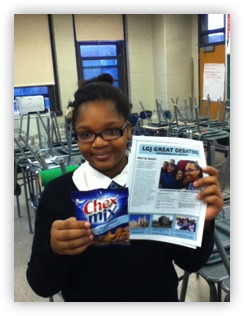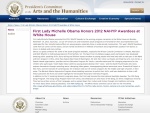Month: February 2013
New York City Urban Debate League
When debate and students come together, great debates happen.

This month’s blog presents the New York City Urban Debate League (NYCUDL) and how it has flourished despite few resources. It’s been rated among the nation’s top after-school programs by many leading education organizations including the National Endowment for the Arts, National Council for the Humanities, and First Lady Michelle Obama calling it, “one of the top arts and humanities based programs in the country.”

According to Erik Fogel who is the driving force behind the NYCUDL,
The Great Debaters program is so successful and so simple and can be replicated to any school. All students can be Great Debaters!
Why debate?
With our nation slipping behind many other countries in the subjects of math and science (2013, CNN) one may find it hard to justify a course of study with no immediate application to tests on basic skills. Unless you’re a lawyer there are very few jobs that will pay you to research and argue a subject.
So again, why debate?
Debate engages students on a deeper and more meaningful level than most classes because it forces students to engage in more serious subject matter and view important issues from many angles.
What type of knowledge, skills and abilities does debate support?
- Rigorous and Critical ThinkingDebate participation promotes problem-solving skills, viewing issues from multiple angles and teaches students to synthesize a large amount of information.
- Master Multiple Subject AreasDebate students learn about current events, politics, philosophy, critical studies, economics, environmental studies, international studies, geography, culture, race, and public policy.
- Listening and Note-taking SkillsDebate requires that you become an excellent listener and good note taker. This helps students learn the material more profoundly and helps them to get better grades.
- Cognitive and Academic Vocabulary SkillsDebate students often read and write at a level 25% higher than their peers.
- Mental and Emotional MaturityDebate forces students to engage each other in a mature and professional manner. It teaches students how others think, how to stand in the face of adversity, and ultimately teaches them self-confidence.
- Academic and Professional AchievementThe average debate student is in the top 10% of their class. Ninety-five percent go on to college and many debaters go on to have very productive professional lives and tend to be more politically active and engaged.
A great many leaders and important thinkers participated in debate. A few famous examples include Justice Sonya Sotomayor, and President’s Kennedy and Johnson.
…I joined the debating team…. That’s where I developed my speaking skills and learned to think on my feet…. You can have brilliant ideas, but if you can’t get them across, your brains won’t get you anywhere.”
-Lee Iacocca, former CEO of Chrysler
So what does a model debate program look like?
Debate competitions traditionally have been reserved for only the schools that could afford the very steep price tag. This means that the vast majority of inner city public schools lack the debate opportunities of their more well off counterparts. But if you want to see the exception that proves the rule, one need look no further than the New York City Urban Debate League (formerly the Bronx Urban Debate League) to find an ideal model. From humble beginnings in a single school in the Bronx, they have since expanded to over thirty-five schools, covering the entire New York City area with plans to expand further. Mr. Fogel said, “Thanks to the McCarthey Dressman Education Foundation we were able to expand our debate team to the entire Bronx and New York City by offering free debate tournaments to all students.”
Essential components of the program include outreach to schools and a wonderful website – but that’s not all. Once a school is identified, “we meet with schools and customize a plan to start a program (recruitment of debaters, curriculum, and teacher training). We match paid and/or volunteer high school, college, and alumni debaters to each school to serve as assistant coaches.”
The League offers specialized programs including policy debate, public forum debate, parliamentary debate, a girls debate league and more. Along with community and school efforts, NYCUDL also holds a free debate camp each summer. Alumni of the program receive college and career advising.
So who is the New York City Urban Debate League (NYCUDL)?
The NYCUDL, led by Erik Fogel consists of a collection of teachers, administrators and other volunteers. They meet with schools on an individual basis to plan customized programs, build a debate curriculum which includes hundreds of files of arguments and evidence, recruit student debaters, train teachers and other volunteers, and organize leagues. They provide the schools with free debate resources (books, handouts, lessons, and videos). Additionally, with all that they also hold two free tournaments every month, more often than not with free transportation to and from schools. Fogel explains, “These tournaments are foremost educational and motivational and so we distribute numerous awards. We provide support for member schools to participate in city, regional and national tournaments for free.”
So what has the impact been thus far?
One need only look at the NYCUDL’s yearly report to know that any resources spent on them is well worth the cost.
- Originally planned to expand into three to five schools, NYCUDL expanded to over twenty.
- Instead of offering a few free tournaments, they offer whole free leagues including an after school league, a weekend league, and a young woman’s league.
- NYCUDL teams have won the City Championship, State Championship, and 3rd, 4th and 5th places at the National Championships (a first for that Title I school).
Most importantly, students in the NYCUDL have 100% college acceptance among their graduating seniors. In fact, NYCUDL alumni often win multiple scholarships. If those facts don’t inspire a debate about the academic enrichment efforts you are implementing in your school, perhaps they should.
Considering starting a debate enrichment program?
To learn more about NYCUDL and the strategies highlighted in this project, visit these resources.
A Meta-analysis of the Impact of Forensics and Communication Education on Critical Thinking

